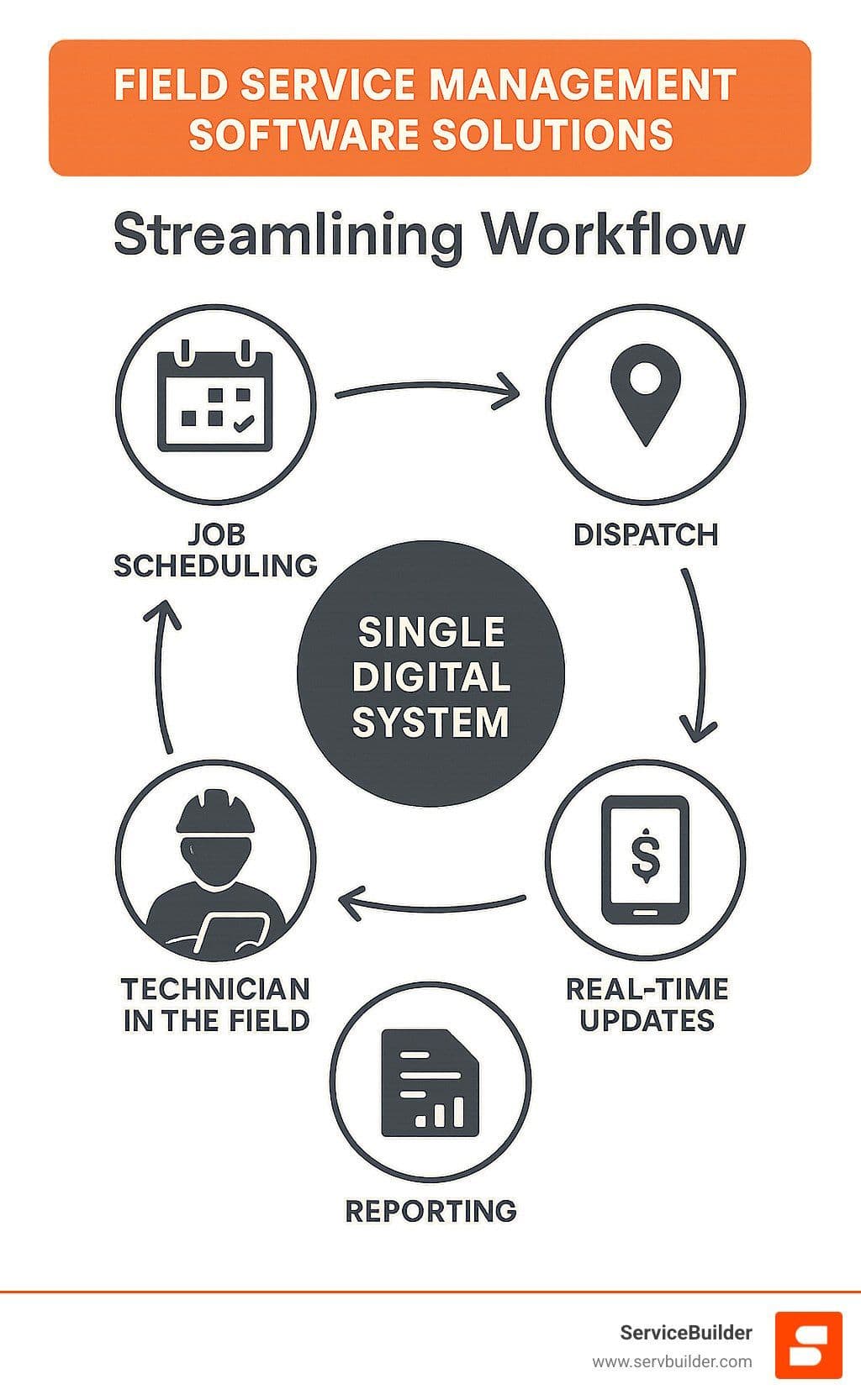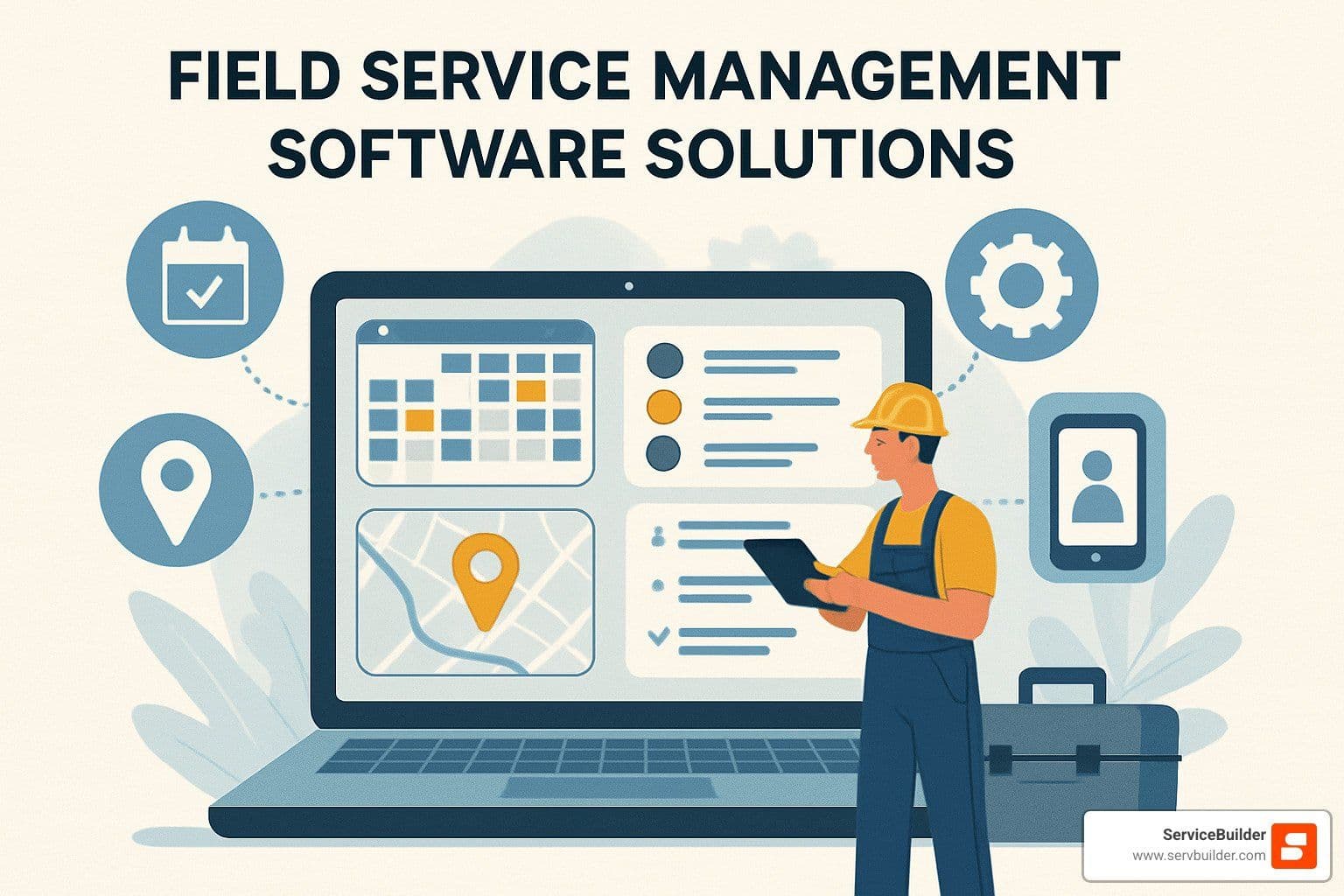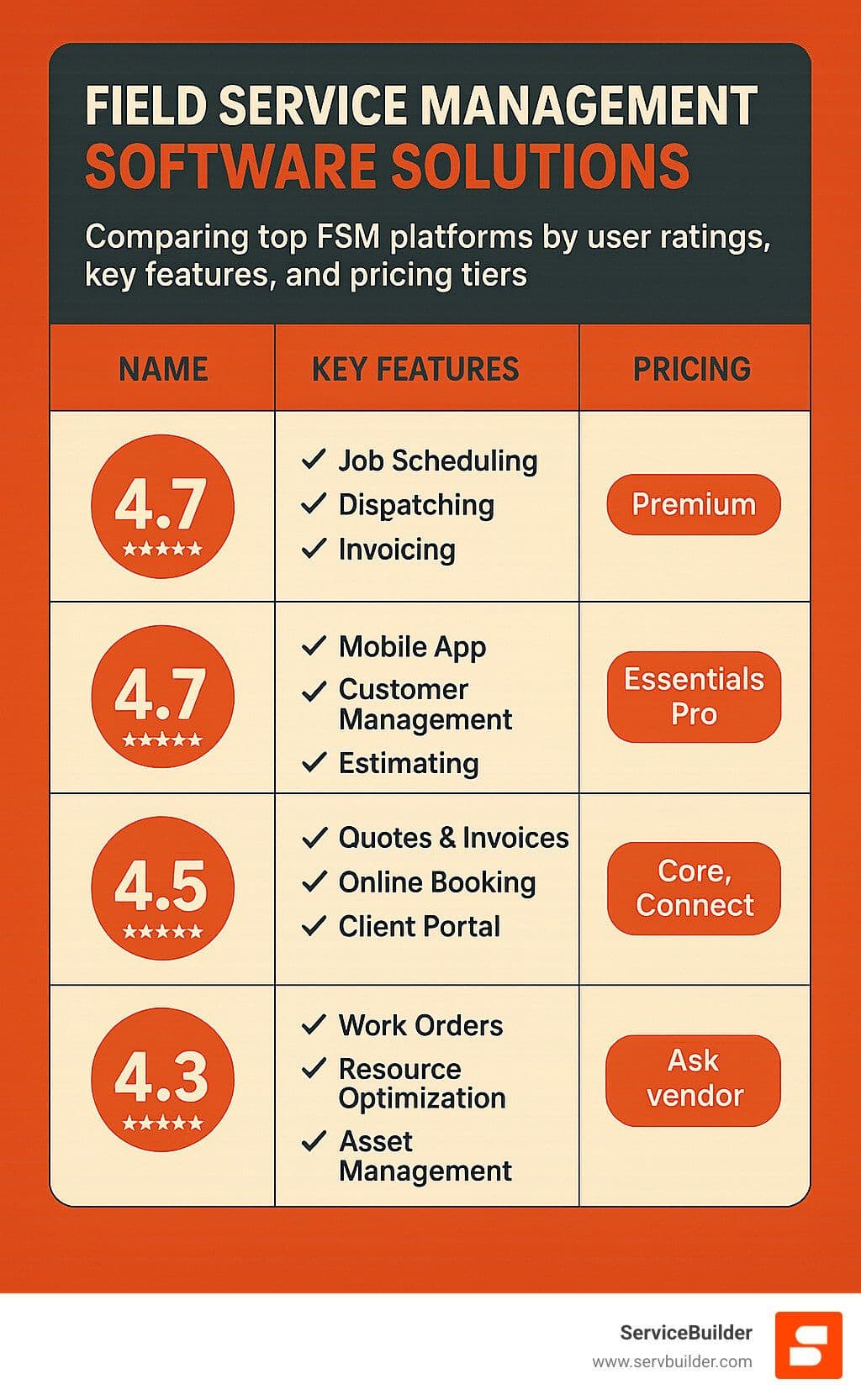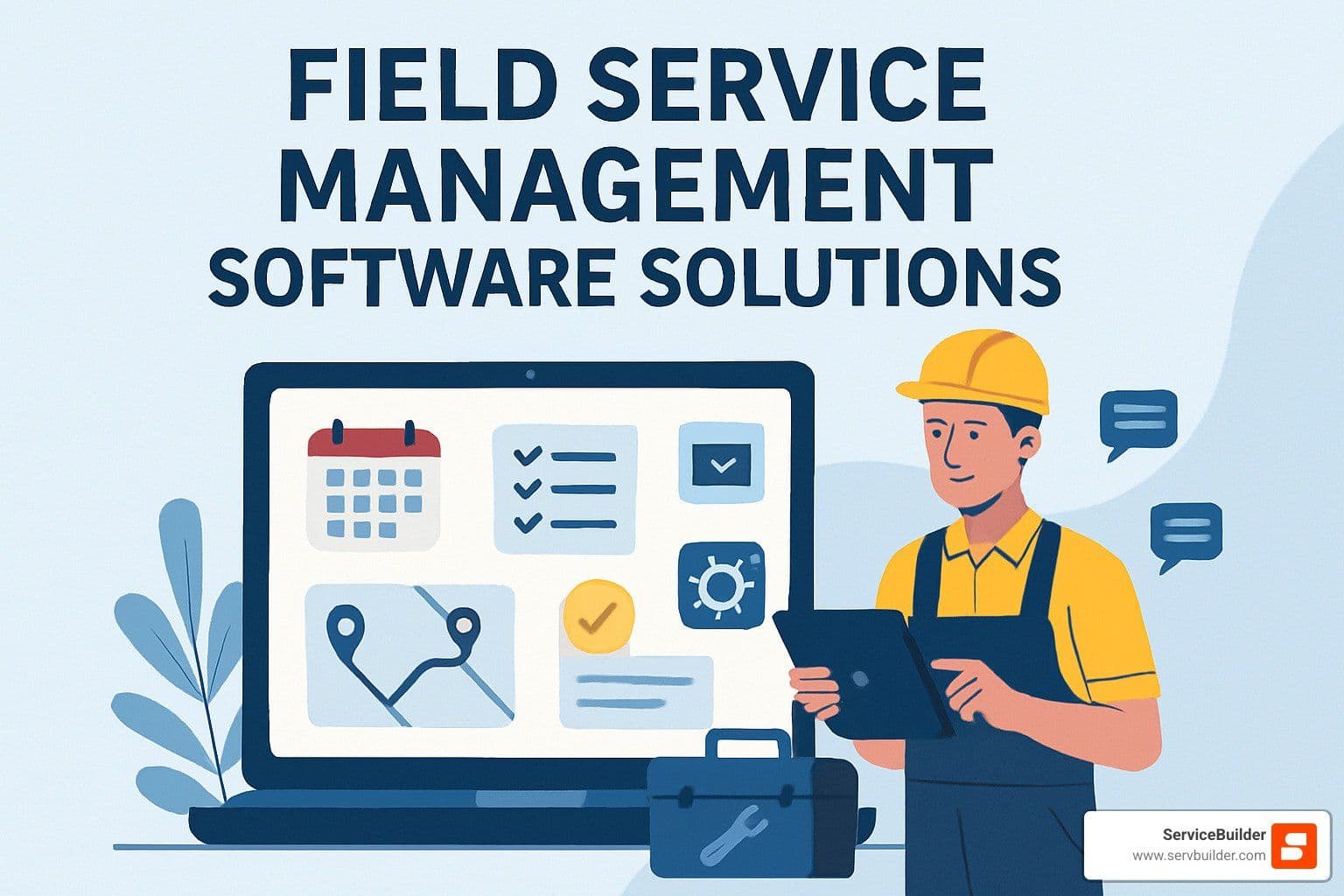Field Service Software Solutions That Actually Solve Problems (No, Really!)
- Andrew Leger
What Are Field Service Management Software Solutions? (Quick Answer & Why They Matter)¶
Field service management software solutions are digital tools that help businesses schedule, dispatch, track, and manage field teams like technicians or crews—all in one platform. If you want a fast, no-fluff overview, here's what you need to know:
What Is It?
Who Needs It?
Core Benefits (Stats)
Cloud or app-based software to manage jobs, teams, and customers in the field
Any business with techs or crews working outside the office (HVAC, plumbing, cleaning, repair, pest control, security, IT, utilities, etc.)
* +15% average revenue growth (ServiceTitan) * +84% productivity (FieldPulse) * Save 12+ hrs/week (Jobber)
Why so popular? Because old-school methods—paper, spreadsheets, endless calls—lead to missed jobs, slow billing, and unhappy customers. With the right FSM solution, you automate scheduling, streamline dispatch, get real-time field updates, and keep everything (jobs, invoices, inventory, and customers) in sync. The result? More completed jobs, less wasted time, and happier customers.
"Not only did we cut our previous costs by 80%, everything is now in a single solution!" – Director of Operations sharing real-world results after switching to FSM software
Market reality: Field service management is now a $1.7B industry and growing over 10% per year. More businesses are ditching paperwork and investing in better tools to stay ahead.
I'm Andrew Leger, founder of ServiceBuilder. After 15+ years building enterprise software for field teams, I designed ServiceBuilder to be a modern, mobile-first FSM platform—solving the real problems that legacy tools missed.

What Exactly Is Field Service Management (FSM) Software?¶
Field service management software solutions are essentially your digital command center for any work that happens outside your main office. Think of it as having a really smart assistant who never sleeps and can keep track of all your field teams at once.
FSM software didn't just appear overnight. Back in the day, businesses relied on clunky on-premise systems that required expensive servers and IT teams to babysit them. Then the cloud revolution changed everything. Suddenly, these powerful tools became accessible through simple web browsers and mobile apps. No more server headaches, no more expensive IT maintenance contracts, and automatic updates that actually worked.
According to Gartner's definition, FSM software supports "service providers whose technicians travel to customer locations to provide installation, repair, inspection and maintenance services." But that barely scratches the surface of what modern field service management software solutions can do.
Today's platforms handle the entire customer journey—from that first phone call to the final payment. They manage work orders, track your technicians through GPS, handle inventory levels, process payments on-site, and generate reports that actually make sense. The best part? Everything stays connected in real-time, so your field teams and office staff are always on the same page.
The industries using FSM have exploded beyond traditional trades. HVAC contractors, plumbers, and electricians are still heavy users, but now you'll find telecommunications companies managing network installations, healthcare organizations servicing medical equipment, security firms maintaining alarm systems, pest control companies handling recurring treatments, and facilities management teams keeping buildings running smoothly.
How field service management software solutions evolved¶
Today's FSM platforms are powered by artificial intelligence for smarter dispatching—imagine software that knows which technician is best suited for each job based on skills, location, and current workload. IoT sensors are now feeding data directly into FSM systems, enabling predictive maintenance that can spot problems before they become expensive emergencies. And thanks to lessons learned during the pandemic, remote service capabilities have become standard, allowing technicians to troubleshoot issues virtually before rolling a truck.
Key benefits in one minute¶
When businesses implement the right FSM solution, first-time fix rates improve dramatically. Why? Because technicians suddenly have access to complete customer history, equipment manuals, and real-time expert support right on their mobile devices.
The revenue impact is impressive too. ServiceTitan customers see an average 15% annual revenue lift through better job completion rates and smarter upselling opportunities. Customer retention jumps by 20% when service delivery becomes more reliable and transparent—customers love knowing exactly when their technician will arrive and what the job will cost upfront.
Ticket sizes typically grow 5-10% when technicians can present professional estimates and process payments on-site. There's something powerful about being able to say "yes" to additional work and handle everything right there on the spot.
Core Features That Drive Efficiency & Profitability¶
The field service management software solutions that really work focus on intelligent scheduling and dispatching, comprehensive work order management, GPS-enabled routing, real-time inventory tracking, integrated job costing, seamless quoting and invoicing, robust reporting dashboards, two-way SMS communication, and reliable offline mobile functionality.
Scheduling, Dispatch & Work Order Magic¶
Smart scheduling is where FSM software earns its keep. The best platforms don't just show you a calendar—they use AI-driven algorithms to automatically match the right technician to the right job based on skills, location, availability, and what parts they have in their truck.
The calendar automation takes care of recurring jobs without you lifting a finger. Capacity planning prevents the nightmare of overbooking your best technician. Skill-matching ensures customers get the right expertise the first time.
Then there's route optimization—a real game-changer. Instead of your technicians zigzagging across town, the software calculates the most efficient routes. Less driving means lower fuel costs and more completed jobs per day.

Work order management tracks every job from the moment it's created to final completion. Your technicians access detailed work orders on their phones, complete with customer history, equipment specs, and step-by-step procedures. No more guessing games or expensive callbacks because someone missed a detail.
Want to avoid the most common scheduling pitfalls? Check out our guide on FSM Scheduling & Dispatch Mistakes.
Mobility Matters for Techs in the Field¶
Your technicians live in their trucks, not at a desk. That makes mobile functionality absolutely essential, not just a nice-to-have feature.
The best FSM apps work seamlessly offline. Why? Because your techs often work in basements, remote areas, or buildings with spotty cell coverage. A robust mobile app keeps working and stores data locally until the connection returns.
Key mobile features include barcode scanning for quick inventory updates, photo upload for documenting completed work, electronic signatures for customer approval, GPS time tracking for accurate billing, and real-time messaging with dispatch.
Accounting, ERP & CRM Integrations¶
The most popular connections include QuickBooks for accounting, NetSuite for enterprise resource planning, Microsoft Dynamics 365 for comprehensive business management, and Salesforce for customer relationship management.
The magic happens with APIs and webhooks that enable real-time data sync. When your technician completes a job, the work order automatically updates in your ERP system, the invoice generates in your accounting software, and the customer record updates in your CRM—all without anyone typing the same information twice.
Inventory, Job Costing & Analytics¶
Smart inventory management tracks parts usage, automates reorder points, and provides real-time visibility into stock levels across multiple locations.
Job costing features track labor, materials, and overhead costs for each job, giving you accurate margin tracking data. The real-time KPIs and custom dashboards turn your FSM data into actionable insights.
Comparing Field Service Management Software Solutions: All-in-One vs Plug-And-Play Integrations¶
When you're shopping for field service management software solutions, you'll quickly face a big decision: Should you go with an all-in-one platform that handles everything, or build a custom stack by connecting specialized tools together?
The all-in-one approach gives you everything under one roof—scheduling, invoicing, inventory, customer management, and reporting all talking to each other seamlessly. The integrated stack approach lets you pick the absolute best tool for each function, then connect them with APIs and integrations.
Factor
All-in-One FSM
Integrated Stack
Setup Time
2-4 weeks
3-6 months
Total Cost
$50-200/user/month
$100-400/user/month
User Adoption
High (single login)
Medium (multiple systems)
Data Visibility
Excellent (single database)
Good (with proper integration)
The total cost of ownership often surprises people. While an all-in-one platform might look more expensive upfront, the integrated approach adds up quickly when you factor in API costs, custom development, and the internal IT resources needed to keep everything running smoothly.
Advantages of true all-in-one field service management software solutions¶
The biggest advantage of all-in-one platforms is the single database architecture. When everything lives in one place, you eliminate the data sync headaches that plague integrated systems.
No double data entry means fewer mistakes and less busywork. Faster onboarding is a huge win for growing businesses. New employees learn one system instead of juggling multiple logins, interfaces, and workflows.
Mobile app parity ensures your field technicians get the same great experience whether they're scheduling jobs, updating work orders, or processing payments.
When third-party integrations make sense¶
Sometimes integrations are the smarter choice, especially if you've got a legacy ERP system that handles complex manufacturing, distribution, or financial processes. Niche modules can also drive integration decisions. Maybe you need specialized warranty management for medical devices, or industry-specific compliance reporting that only one vendor offers.
A phased rollout approach works well for larger organizations. You might start with FSM for scheduling and dispatch, then gradually integrate billing, inventory, and customer management as your team gets comfortable with the new processes.
The 2025 Leaderboard: Best Field Service Management Software Solutions & How They Stack Up¶
After analyzing user reviews, feature sets, and real-world performance data, a clear group of leaders emerges in the field service management software solutions space.
ServiceTitan has carved out a dominant position in residential trades. Their customers consistently report 15% revenue increases annually, plus they're seeing 5-10% growth in ticket sizes and 20% improvement in customer retention.
FieldPulse focuses on simplicity without sacrificing power. 77% of their users report increased sales and 84% see productivity improvements. Their average customer experiences 78% year-over-year growth and 89% revenue increases.
Jobber has quietly built an empire serving over 250,000 home service professionals across 50+ industries. Their users save an average of 12+ hours per week and achieve 44% revenue growth in their first year.
For businesses already invested in Microsoft's ecosystem, Dynamics 365 Field Service earns a solid 4.3/5 rating from 130 Gartner Peer Insights reviews. Salesforce Field Service also maintains that same 4.3/5 rating from 97 reviews.
SAP Field Service Management leads in utilities and industrial manufacturing, offering AI-based scheduling and crowd service capabilities that smaller platforms can't match.
Other notable mentions include Workiz for its user-friendly interface, Connecteam for budget-conscious teams, Fieldwork and Fieldpoint for specialized use cases.
For deeper market insights, Gartner's Market Guide for Field Service Management provides comprehensive analysis of the competitive landscape.

Budget-Friendly & Free Options for Small Teams¶
Connecteam offers a free-forever plan for teams up to 10 people, making it the standout choice for small field service businesses just getting started with digital tools.
SafetyCulture provides a free plan that's perfect for basic inspections and checklists. ServiceM8's entry-level tier starts at just $9 per month, proving that professional field service management doesn't have to break the bank.
FieldCamp offers a generous trial period that gives you plenty of time to test drive their features before committing.
Real-World Results & Case Studies¶
Take the Naylor case study, where a commercial HVAC company was drowning in manual data entry and had almost no real-time visibility into their field operations. After implementing FSM automation tools, they completely transformed their processes and saw significant efficiency gains.
One director of operations told us they cut their previous costs by 80% after consolidating everything onto a single FSM solution. Another field service manager shared how they now schedule 15-20 crews daily with individual project time tracking.
For more detailed insights from real implementations, check out the Case Study: Naylor.
The Future of FSM: Trends & Emerging Tech You Can't Ignore¶
The field service world is changing fast. AI-powered dispatching is getting scary smart. We're not just talking about basic scheduling anymore—these systems are learning from traffic patterns, weather forecasts, technician expertise, and even customer preferences.
Predictive maintenance is turning the whole industry upside down. Instead of waiting for equipment to break, IoT sensors and machine learning are spotting problems before they happen. Imagine calling your customers to schedule maintenance before they even know they need it.
Augmented reality remote assistance sounds like science fiction, but it's happening right now. Expert technicians can literally see through a field worker's eyes via video calls with AR overlays, guiding them through complex repairs without traveling.
Drone technology is taking off for inspections and site surveys. This is especially huge for utilities and telecom companies where getting to equipment can be dangerous or require expensive equipment.
Sustainability features are becoming must-haves. Modern FSM platforms help businesses track their environmental impact through smarter routing, paperless operations, and energy-efficient scheduling.
Crowd service platforms are creating new possibilities for handling busy periods. These systems connect you with networks of certified third-party technicians when demand spikes.
Generative AI chatbots are handling routine customer service tasks that used to eat up your staff's time. They schedule appointments, provide service updates, and answer common questions—leaving your humans free to handle the complex stuff.
If you're curious about what's real versus marketing hype in this space, our analysis on AI in Field Service: Real vs Buzzwords cuts through the noise.

Preparing Your Business for Next-Gen field service management software solutions¶
The most successful businesses aren't just buying the latest field service management software solutions; they're building a data-driven culture where decisions come from real numbers, not gut feelings.
Change management is huge when you're implementing new tech. Your team needs to understand not just how to use new tools, but why these changes will make their jobs easier and more rewarding.
Cybersecurity is getting more important every day. As FSM systems handle more sensitive customer data and connect with more business systems, you need platforms with solid security features and proper compliance certifications.
Skills training should focus on both technical know-how and the human side of service. The best technology amplifies what your people do well—it doesn't replace them.
Frequently Asked Questions About Field Service Management Software Solutions¶
How does FSM improve customer experience?¶
Field service management software solutions transform how customers interact with your business from the first call to the final payment. Instead of wondering when their technician will show up, customers get automated notifications with real arrival times. They can track their service appointment like they track a pizza delivery.
Your technicians arrive prepared because they have complete service history at their fingertips. No more awkward conversations where customers have to explain their problem three times to three different people.
The professional touch makes a huge difference too. Instead of scribbled estimates on the back of receipts, customers receive clean, branded quotes on tablets. They can approve work with electronic signatures and pay on the spot.
Two-way SMS communication keeps everyone in the loop without phone tag. Customers can reschedule with a simple text, get updates on parts delivery, or request follow-up service.
Are there industry-specific field service management software solutions?¶
Absolutely. While the core functions—scheduling, dispatching, work orders—work for everyone, different industries have unique needs that generic software just can't handle.
Take ServiceTitan, which built its reputation focusing specifically on residential trades like HVAC, plumbing, and electrical work. They understand that these businesses need features like seasonal maintenance reminders, equipment replacement tracking, and financing options for big-ticket items.
Pest control companies have completely different requirements. They need recurring treatment schedules, chemical usage tracking for regulatory compliance, and the ability to manage contracts with automatic renewals.
Healthcare equipment servicing requires detailed documentation for compliance, parts traceability, and integration with medical facility management systems. Telecommunications companies need features for network installations, equipment provisioning, and complex project management.
But here's what I've learned: the fundamentals remain the same. Whether you're fixing air conditioners or installing security systems, you still need to schedule jobs, dispatch technicians, track work, and bill customers. The industry-specific features are usually add-ons to this core functionality.
What factors should I consider before buying?¶
Start with your biggest pain point. Are you losing money because scheduling is a mess? Are customers complaining about communication? Are invoices taking weeks to send? Pick the one problem that's costing you the most sleep and money. Your FSM software should solve that problem first.
Consider your team's comfort with technology. If your technicians still prefer paper and pencil, prioritize ease of use over fancy features. You can always upgrade later.
Map out your current systems. Write down every piece of software you currently use—QuickBooks for accounting, Excel for scheduling, whatever CRM you have. Your new FSM platform needs to play nicely with these systems.
Budget for the real costs. The monthly subscription is just the beginning. Factor in setup fees, training time, data migration, and potential integration costs.
Think about tomorrow, not just today. Choose software that can grow with your business. If you have five technicians now but plan to have fifteen in two years, make sure your platform can handle that growth.
The best advice I can give? Take advantage of free trials and demos. Most reputable FSM providers offer hands-on trials. Use them. Get your team involved.
Conclusion & Next Steps¶
Field service management software solutions are no longer optional for businesses that want to stay competitive. The numbers speak for themselves—companies consistently see 15-89% revenue increases, massive productivity gains, and happier customers who stick around longer.
The businesses jumping on this technology early are building advantages that get stronger over time. Better customer experiences mean more word-of-mouth referrals. Higher efficiency lets you complete more jobs each day. And real-time data helps you make smarter decisions instead of guessing.
The ROI story is compelling. When you can boost revenue by double digits while cutting operational headaches, the software practically pays for itself. Plus, your technicians actually enjoy their work more when they're not drowning in paperwork and confusing schedules.
At ServiceBuilder, we're not just building another FSM platform—we're reimagining what field service management can be. Our focus is on solving the real problems that keep you up at night, with innovative solutions that respect your privacy and protect your data.
Ready to see what modern FSM can do for your business? We'd love to show you what's possible. Join our early access program and be among the first to experience next-generation field service management technology. No spam, no pushy sales calls—just updates on genuine innovations that could transform how you work.
The field service industry is changing fast, and the window for competitive advantage is still open. The question isn't whether you need FSM software anymore—it's which solution will best position your business for the growth and success you're working toward.
For a step-by-step guide to making the right choice, check out our comprehensive resource on How to Choose FSM Software in 2025. It'll walk you through everything you need to know to make a confident decision.
The future of field service is here. The only question is whether you'll lead the charge or play catch-up.